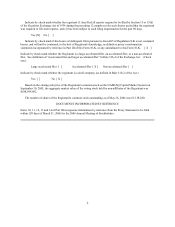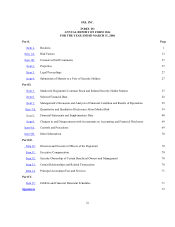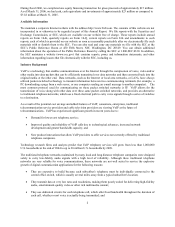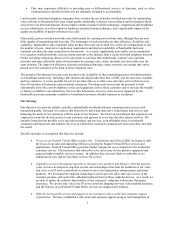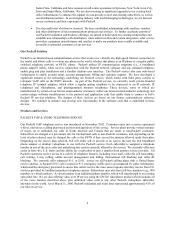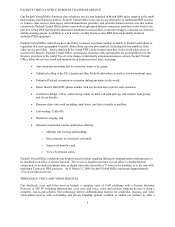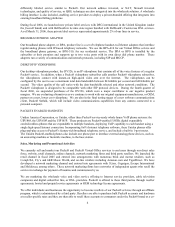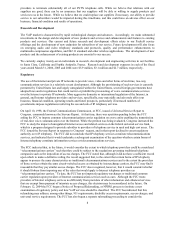8x8 2006 Annual Report Download - page 12
Download and view the complete annual report
Please find page 12 of the 2006 8x8 annual report below. You can navigate through the pages in the report by either clicking on the pages listed below, or by using the keyword search tool below to find specific information within the annual report.9
obligations of IP-based voice services providers and network providers under the Communications Assistance to
Law Enforcement Act, which establishes federal requirements for wiretapping and other electronic surveillance
capabilities. These NPRM processes are currently underway (the latest information on these proceedings is
available from the FCC’s VoIP website at http://www.fcc.gov/voip). We are unable to predict the outcome of these
processes at this time.
In addition to the NPRM process, several recent decisions by, and the outcome of the various proceedings pending
before, the FCC may affect the regulatory status of Internet telephony. On October 18, 2002, AT&T filed a petition
with the FCC seeking a declaratory ruling that would prevent incumbent local exchange carriers, or ILECs, from
imposing traditional circuit-switched access charges on phone-to-phone IP services. This petition was denied on
April 14, 2004. On February 5, 2003, pulver.com filed a petition with the FCC seeking a declaratory ruling that its
“Free World Dialup,” which facilitates point-to-point broadband Internet protocol voice communications, is neither
telecommunications nor a telecommunications service as these terms are defined in the Telecommunications Act of
1996. This petition was granted on February 12, 2004. In September 2003, Vonage filed a petition for declaratory
ruling requesting that the FCC find an Order of the Minnesota Public Utilities Commission, MPUC, requiring
Vonage to comply with state laws governing providers of traditional telephone service to be pre-empted because
Vonage’s broadband Internet telephony service is an information service. On November 9, 2004, the FCC adopted
an order granting Vonage’s request for pre-emption. In that order, the FCC ruled that Vonage’s service was
inherently interstate and subject to exclusive federal jurisdiction, but declined to rule on the issue of whether it is a
telecommunications service or an information service. Judicial appeals from the FCC’s Vonage order are pending.
On February 5, 2004, SBC Communications Inc. filed two petitions with the FCC relating to IP communications.
The first requests a declaratory ruling that all services offered on an IP platform are interstate information services,
not telecommunications services, and that they are immune from state regulation as a result. The FCC has
incorporated this petition into its generic IP-enabled services rulemaking, where it will consider the regulatory status
of Internet protocol voice communications. The second SBC petition requests that the FCC forbear from applying
certain common carrier regulation to services offered on IP platforms. On May 5, 2005, the FCC issued an opinion
and order denying SBC’s forbearance petition, and concluding that the petition was procedurally defective.
Several states have also demonstrated an interest in regulating VoIP services at a state public utility level, as they do
for providers of traditional telephone service from regulated carriers. In certain cases, these state governments and
their regulatory authorities have moved to assert jurisdiction over the provision of intrastate IP communications
services (calls that begin in that state and end in that state) where they believe that their telecommunications
regulations are broad enough to cover regulation of IP services. If this trend continues, and if state regulation is not
preempted by action by the FCC we may become subject to a "patchwork quilt" of state regulations and taxes, which
would increase our costs of doing business, and adversely affect our operating results and future prospects.
We have been contacted by several state regulatory authorities regarding our Packet8 service. By letter dated August
13, 2003, the Public Service Commission of Wisconsin, or WPSC, notified us that the WPSC believes that we, via
our Packet8 voice and video communications service, are offering intrastate telecommunications services in the state
of Wisconsin without certification from the WPSC. According to the WPSC's letter, it believes that we cannot
legally provide Packet8-based resold intrastate services in Wisconsin without certification from the WPSC. In
addition, the WPSC believes that Packet8 bills for intrastate services to Wisconsin customers are void and not
collectible. The letter also states that if we do not obtain certification to offer intrastate telecommunications services,
the matter will be referred to the State of Wisconsin Attorney General for enforcement action. The letter also states
that even if we were certified by the WPSC, the previous operation without certification may still subject us to
referral to the State of Wisconsin Attorney General for enforcement action and possible forfeitures. On October 15,
2003, we responded to the WPSC and disputed its assertions by asserting that we are an information services
provider and not a telecommunications provider. While we do not believe that the potential amounts of any
forfeitures would be material to us, if we are subject to an enforcement action, we may become subject to liabilities
and may incur expenses that adversely affect our results of operations.
On September 17, 2003, we were contacted by the Ohio Public Utilities Commission, or OPUC, and asked to
respond to a questionnaire on Voice over IP technologies that the OPUC is conducting. The OPUC inquired as to the
nature of our service, how it is provided, and to what Ohio residents the service is made available. The questionnaire
did not contain any assertions regarding the legality of the Packet8 service under Ohio law or any statements as to
whether the OPUC believes we are subject to regulation by the state of Ohio. We responded to this questionnaire on
October 20, 2003.


